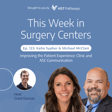Introduction to 'This Week in Surgery Centers'
00:00:01
Speaker
Welcome to This Week in Surgery Centers. If you're in the ASC industry, then you're in the right place. Every week, we'll start the episode off by sharing an interesting conversation we had with our featured guests, and then we'll close the episode by recapping the latest news impacting surgery centers. We're excited to share with you what we have, so let's get started and see what the industry's been up to.
Preparing New Surgery Centers: Insights from Will Schlaff
00:00:28
Speaker
everyone. Here's what you can expect on today's episode. Will Schlaff joins us again this week as we continue with our series of episodes dedicated to De Novos. Will is an ASC Development and Operations Specialist, so he has seen it all, and today we're focusing on preparing the business side of the house for your new surgery center.
00:00:49
Speaker
We cover capital investments, vendor contracts, finding the right scheduling and billing software, handling HR functions, and everything in between.
Industry News Highlights
00:00:58
Speaker
And in our news recap, we'll cover the latest collaboration between HCA Healthcare and Google, what's going on with CMS and nursing homes, the Joint Commission's new Sustainable Healthcare Certification Program, and of course, end the news segment with a positive story about a pharmacist in Maui
00:01:17
Speaker
who saved hundreds of lives during the wildfires. Hope everyone enjoys the episode and here's what's going on this week in surgery centers.
When to Start ASC Preparations
00:01:29
Speaker
Will, welcome back to the podcast. Yeah, Nick, thanks for having me.
00:01:35
Speaker
Well, last time you joined us about a month or so ago, we talked about more upfront in the de novo planning process. We talked about feasibility assessments and preparing for opening from an overall planning and feasibility perspective. I wanted to shift gears today and talk about a later stage in the process, which is preparing for opening.
00:01:55
Speaker
and specifically around the business side of preparing for opening and thinking through some of those key operational processes that need to be in place and thought through before you open your facility. So to get us started here, at what point in the process should ASCs and ANOVA ASCs consider preparing for opening, including some of the key pieces around infrastructure, equipment you want to have in place, and those key operational processes.
ASC Design and Safety Considerations
00:02:24
Speaker
Yeah, that's an interesting question because it will surprise a lot of people that it really starts during the facility design phase. In any given state department of health or health authority, they're going to ask you when you submit your plans for approval and certification.
00:02:48
Speaker
they're going to ask you for a functional plan, like an operative narrative, right? And in addition to when you submit your architectural and MAP plans. And this is just a side note is, again, you need to pay attention to the crosswalk between state licensure and Medicare CMS requirements, right? Because you just need to make sure that you're meeting both, okay?
Optimizing Facility Flow for Safety
00:03:15
Speaker
And so they'll come back and they'll ask you, the functional plan, it's pretty extensive, but you really get into the clinical in the back office, in front office actually, the flow of the business. And they'll focus on safety risk assessments, which will include things like infection control, risk assessment, patient handling and movement, fall prevention,
00:03:41
Speaker
medication safety, behavioral mental health risk, security risks, life safety will be addressed mainly in the MEP, equipment management program, and really focusing too on the circulation patterns for the staff, right, which is very clinical based.
00:03:59
Speaker
the visitors and the vendors in traffic patterns to avoid things like cross-contamination and limiting patient anxiety, like you don't want them going through when there's a kid crying because he just had surgery.
Budgeting for Capital Equipment
00:04:13
Speaker
And so you really start thinking about the flow of the facility at the design, the facility design phase, right?
00:04:22
Speaker
Again, a good architect is worth their weight in gold. They'll walk you through this, they'll listen to you, and they'll give you options and recommendations. And then at that point, you're really starting to create and customize your policy and procedures. Got it. That's a helpful sequencing, which is design, functional flow.
00:04:44
Speaker
policies and procedures. And I want to come back to those policies and procedures. One thing I wanted to hit on is, as you think through the process, you also need to think through equipment and tooling and infrastructure.
Cost-Saving Strategies in Equipment Financing
00:04:57
Speaker
And capital equipment is a big decision, a big purchase. As you think about capital equipment from a budgeting perspective, from a financing perspective, where does that come into play and what factors would influence that decision?
00:05:13
Speaker
Well, equipment planning is a big part of the proforma and the cost and the startup of the facility, right?
00:05:23
Speaker
And there's really two perspectives. There's one perspective if it's a joint venture with a hospital and or third party management development firm or an independent facility. And when it comes down to cost and the financing that are needed,
00:05:46
Speaker
The joint venture with the hospital management development, it's one of the perks, right? They're going to have relationships. You're going to be able to leverage that. You're going to be able to get maybe better terms and possibly avoid a personal guarantee from the owners, right? Physicians do not like personal guarantees. And this will be a consistent theme throughout the whole conversation here. And so you set up your power equipment. You have refurbed.
00:06:16
Speaker
options obviously and you have new options right and really the way I like to approach this is you want to consider some for refurb and you want to save money wherever you possibly can but you don't want to risk it with certain pieces of equipment where it might come back and bite you.
00:06:39
Speaker
So, refurb equipment as much as possible. I avoid refurb equipment with complex electronics and mechanics, right? I think stretchers, IV poles, click buckets, things of that sort. Sterilizers, OR tables, and lights, you could consider refurb, but you want to make sure that they've gone through a full refurb process where
00:07:07
Speaker
they're completely taken apart, they're repainted, it's pretty much brand new. Okay, but it obviously doesn't come with the original manufacturer warranty, make sure you have a good warranty in place. And then really the key is once you get operational with refurb equipment, is to make sure you have a strong
00:07:27
Speaker
engineer, service provider that's reliable and can get up there. Major piece of equipment goes down. You can't sterilize equipment. You can't operate because the operating table isn't going up and down, etc. That'll start costing you a lot of money. So you want to be proactive on that side. And then with the new equipment, more specialized stuff,
00:07:54
Speaker
vital monitors, anesthesia machines, you want to make sure that they're compatible and could be integrated with the facility's electronic charting software system, practice management system, etc. So you want to make sure that they are new models, they can go, they're wireless compatible, things of that sort.
00:08:19
Speaker
Super helpful. And as you think through financing considerations around those, are there many different options or approaches there?
Comprehensive Financing Considerations
00:08:27
Speaker
Yeah, there's a lot of specialized companies that just focus on capital equipment financing. You can obviously go traditional banks. You can usually finance your equipment line 100%. Equipment will act as collateral. They'll usually want to see some financials and things of that sort. But again, if you have a JV with a hospital and a large management company, you can leverage those relationships.
00:08:55
Speaker
Yep. Got it. Okay. So there's decisions to make in terms of your equipment and where you go new versus potentially refurbished. So that's, those are some financing considerations on the equipment side, Will. What are some other financing considerations for owners and business owners as they are building out their facilities?
00:09:16
Speaker
Yeah, we were talking earlier about personal guarantees and how doctors want to avoid those. Back in the prior to 2010, there was a lot of non-recourse options out there for, for an example, operating lines. Those non-recourse options don't exist anymore.
00:09:33
Speaker
And whenever you're going to be borrowing money for these projects, you're going to have to probably be personally guaranteeing it. Okay. And I think there's two more financing considerations that you need to, there's two more finance considerations here is.
00:09:49
Speaker
First off, you need to consider construction. And construction, though, it's pretty traditional. And you're usually going to have to come up with 30 percent of that facility build out. And we're just talking tenant improvement right now. And then the other one is the operating line. And the operating line is actually you need to be very thoughtful behind this.
00:10:19
Speaker
And that's when you're getting into building the pro forma and the financial projections here, because you're definitely going to want to come up with eight to 12 months worth of expenses.
00:10:33
Speaker
to determine the size of the operating line. You never wanna go back and have to do a capital raise, a capital call. Nobody likes that, right? And so you need to be very conservative, consider the revenue and expenses and consider the volume ramp up period and also be prepared for unexpected delays. And so with that,
00:11:02
Speaker
Doctors, whenever you're getting in and starting a business, they're gonna have to invest some money. So how do they determine how much cash do they need to put in, right?
Key Operational Processes and Vendor Management
00:11:12
Speaker
And really, there's two things you have again, as I mentioned, the 30% the facility build out for the construction note. And then you have to calculate the startup cost, which is going to be prior to licensure, right? Prior to when you're open for business. And so you have to add all those things together. You got the 30% facility build out costs. And then you have accreditation, licensure, application fees, architectural fees.
00:11:36
Speaker
ASC development fees is always a big one. Legal power inventory, because you're going to want to stock that inventory up ahead of time. Salaries, you're going to have an administrator in there probably six months before licensure, a nurse manager, clinical director for three months before licensure.
00:11:56
Speaker
materials coordinator and office manager, maybe one to two months, and then you start staffing up from there. And so take those combines, add it up, your startup costs and that 30% build out is typically proportionate among ownership, equity, by owners. That is the money that they're going to have to cough up to get into this project.
00:12:19
Speaker
Great. I wanted to shift gears on you here and transition over to some of the key operational processes that ASE operators need to be thinking about as they prepare to open. And so big operational processes like the billing process or the inventory management process. What are those key processes that operators need to think about and plan around upfront?
00:12:42
Speaker
The first thing you need to do, one of the first things is you're thinking vendors. There's a lot of service providers, supplies, equipment, things of that sort. Anesthesia, pharmacy, pharmacy consultants, how you're going to handle your medication management, waste management, cleaning services, laundry, things of that sort.
00:13:03
Speaker
And again, two perspectives. Joint venture with the hospital. You might want to leverage some of those things. Leverage laundry, if you can. Cleaning services, if you can. Engineering, facility management services.
00:13:19
Speaker
if the hospital has it. Also, with large management companies, too, and hospitals, vendor contracts, I think about, first off, research the GPOs. Do you have the ability to join the hospital's GPO or that large management company's GPO? Group purchasing power. These are big companies. They have a lot of pull.
00:13:41
Speaker
But at the same time, the GPO might not be the best pricing for these supplies and equipment vendors, right? So you also want to look at local contracts. And when it comes down to hardware and surgical instruments, for an example, local contracts usually are better than the GPO's.
00:14:02
Speaker
because these vendors have strong relationships specific with the surgeons. And it does come down to surgeon preferences, too, and they will be considered, right? But even though, put surgeon's preference aside, you always want to get at least three competitive bids, right? And then you can use that to cram down pricing even further, right?
00:14:23
Speaker
And then also there's rebate programs. You're going to want to compare those to the discounted rates for the contract. A lot of these guys, let's say soft tissue graphs, things of that sort, you're going to need a refrigerator storm, right? You may be able to get a nice refrigerator out of there with some wireless capabilities so they can track temperature and things of that sort. So you don't have to worry about managing that.
00:14:46
Speaker
and they might just give it to you because you're going to be buying their graphs, right? And while you're operating too, it's important to note that you're going to want to cross-reference these contracted rates, keep track of that rebate program, make sure you're getting paid what you're supposed to, and make sure that you're getting the prices per unit that you're contracted with them for.
00:15:10
Speaker
And also, with the rebate program, it can be a substantial amount of money, right? And if you're coming up, they usually break it down from like, I don't know, 4% rebate upwards to 8% if you spend a certain amount of money. And if you're coming up to that rebate date where they put the stake in the ground and you're supposed to have spent that certain amount of money,
00:15:34
Speaker
you're going to want to ask and say, hey, can I buy another $20,000 in whatever? Because we know we're going to use these. So I can make that date and jump up to the next level of rebate, you might be able to get go from six to 7%. Just if you're buying ahead of time, right? Those are some things to consider on that side. Let's see here anesthesia
00:16:00
Speaker
A lot of times the anesthesia groups, depending on whether they have CRNAs, and it's going to be
Role of Software and Outsourcing in Operations
00:16:08
Speaker
relationships. It's going to be relationships with the joint ventures with the hospital. And sometimes it's hard to find anesthesia. And so you want to make sure that you're going to be able to work with these guys. They're going to be on your medical staff. They may be a medical director. So I think that personal relationships are important there too.
00:16:26
Speaker
And then you do want to keep track of all these contracts. So build yourself a simple vendor grid that shows the terms of the contracts, the payment terms, when the contracts are up for renewal. So you're prepared to negotiate them on the next round.
00:16:42
Speaker
Fantastic. And so we talked about capital equipment. We've talked about supply vendors, anesthesia. What about software? What role does software play in enabling some of these key processes that ultimately run your ASC?
00:16:58
Speaker
Technology has come such a long way. Software plays a huge role in how operations are and how efficient they are. And the software is that you're going to want to consider, you're looking at inventory, practice management, electronic charting, scheduling, billing, those types of functions.
00:17:16
Speaker
The best way to do that is to reach out to other facilities and inquire about their experiences and their preferred software platforms. Visit other facilities and obtain firsthand experiences. And then also consider the cost. When you're negotiating out and getting bids for these software programs, perhaps they'll
00:17:39
Speaker
discount during the facility startup period. Think about the integration abilities, how intuitive it is. Let your current staff members demo it, get their feedback, get the doctor's feedback. Think about reporting capabilities and available dashboards and ask your colleagues out there about support services and things of that sort.
00:18:04
Speaker
The support services are really important, especially during the development facility. Absolutely. And you touched on their billing and the billing process. And if we take a step back and think about the overall revenue cycle and preparing to get set up, that's likely a pretty big decision, right, in terms of, hey, how do we set up our revenue cycle? Do we use an outsourced provider? Do we think about doing it in-house?
00:18:32
Speaker
How do you advise de novo facilities and owners to think about that revenue cycle decision?
00:18:37
Speaker
It'll be one of the largest expenses for operating this business. If it's a joint venture over the hospital and or management company, they will probably want to provide that service and you'll be contracted with them. And that will probably be in place when you sign that development agreement. And they're very good, but you do pay for it. And it's a percentage of collective receipts, typically in the four, four and a half range.
00:19:06
Speaker
If independent, personally, in my opinion, I would recommend outsourcing revenue cycle management. If you want to save a few bucks, you're going to end up with maybe one or two individuals, and I just don't see them handling it efficiently. There's too many moving parts in the revenue cycle management.
00:19:26
Speaker
There's a lot of expertise that is needed in each individual part. Now you may be able to cross train them for if one individual is out, they can cover them, but they're not going to be as good. Things like pre-verification, authorization, coding, implant tracking, other reimbursable charges that may be out there, processing clean claims. Then you have AR management and follow up. This stuff is so time consuming.
00:19:53
Speaker
And also communicating patient liability and that cash management side collect upfront. You're also going to have to track bad debt and overpayments. And then you might even have to think about out of network billing, which is even more time consuming.
00:20:09
Speaker
So again, I mean, I would recommend finding a very good third party service provider to handle your revenue cycle management. And it's one of the reasons why, you know, these established management and development companies are around because they know how to do it really well. Absolutely. Great. Well, we've covered a lot of topics across the spectrum of preparing for opening from a business perspective, from a process perspective.
00:20:38
Speaker
Anything that we haven't talked about yet that you think is super important?
HR Services and Cash Flow Management
00:20:43
Speaker
If HR functions, I again, I would also think about third party and just because it's it can be get messy and administratively development of strong policy and procedures are gospel and must be filed to ensure efficient front office workflows, back office workflows, etc.
00:21:10
Speaker
And make sure during your ramp up period. You you're in a cash burn operational mode right keep accurate daily cash balances and forward looking cash flow projections and take into consideration obviously your fixed costs and average out.
00:21:31
Speaker
the past variable expenses, keep it conservative and make sure that you have an adequate amount of cash in the bank to get you through the ramp up period. It's a great tip and certainly one that you've, I've heard you underscore several times during our conversations is that initial operating budget and making sure you're sufficiently thinking through that. So we may already have your answer for this, but one final question.
00:21:57
Speaker
We do this every week was one thing our listeners can do this week to improve their surgery centers.
Enhancing Patient Education and Communication
00:22:04
Speaker
Oh man. One thing that really comes to my mind and we talked about patient liability is patient education and clear communication, especially between the professional practice and the facility itself.
00:22:21
Speaker
Communicate clearly regarding patient liability, the difference between professional fees, facility fees, anesthesia fees, if DME may be involved, etc. Make sure the patients understand this. It's so common.
00:22:37
Speaker
For a patient to get coded for their liability on the professional side, nobody mentions these other service providers, right? And they think that's all they need to come up with. That is one way to really drop your patient satisfaction score.
00:22:54
Speaker
And then post-surgery education, I think it's just as important. Set these patients' expectations with pain. Let them know about physical therapy, any kind of braces they need to wear, training, that DME kind of stuff, the effects of anesthesia, and the expectations. Make sure that they have a family member available to come and pick them up, right? These are things that really affect your patient satisfaction scores.
00:23:21
Speaker
Awesome. Great advice. And thanks so much, Will, for joining us again today. You got it, Nick. Thank you.
HCA and Google's AI Partnership
00:23:30
Speaker
As always, it has been a busy week in healthcare, so let's jump right in. In our first story, I'm excited to share with you the latest collaboration between HCA Healthcare and Google. HCA is the largest for-profit hospital chain in the US, and they are currently exploring ways to reduce its clinicians' administrative burden through the use of generative AI.
00:23:54
Speaker
Now, their partnership with Google began in 2021, initially focused on data privacy and security. But this year, the two organizations expanded their collaboration by exploring ways to integrate Google's generative AI into HDA's workflows.
00:24:12
Speaker
So a pilot project that started in February has 75 doctors and four HCA emergency departments using an app from AugMedx, A-U-G-M-E-D-I-X on their phones. And this app captures conversations with patients and transforms those conversations into clinical notes, which physicians can then review and finalize.
00:24:37
Speaker
Now, natural language processing and medical dictation is nothing new that's existed for a while. But with Google's generative AI, it's intended to enhance the process and doctors are encouraged to verbalize more to one provider richer input for the AI.
00:24:54
Speaker
And then two, improve the patient's understanding in real life. So kind of has dual benefits. And so far during the pilot, the clinical notes are requiring 50% of the work to be done through AI and 50% to be done by a human or medical scribe. But the hope is to reach a point where AI can actually create 75 to 80% of the clinical notes, thus reducing that administrative burden.
00:25:20
Speaker
And next up, HCA intends to develop an AI system for generating reports during nurse handoffs. So I'm curious how you feel about this pilot and kind of the projection of AI and how it's being used, you know, reducing the administrative burden and possibly using it to generate reports for nurse handoffs. Sound like good ideas to me, but would love to hear your thoughts on our LinkedIn page as well.
CMS Staffing Proposals: Impacts and Implications
00:25:49
Speaker
Switching gears, it wouldn't be a week of news without addressing staffing issues in some sort of way. So here we go. 81% of nursing home facilities nationwide currently fall short of the proposed CMS staffing thresholds.
00:26:05
Speaker
So a few weeks ago, CMS introduced their guidance in response to longstanding concerns that inadequate staffing levels negatively affect the care the residents receive at nursing homes. So the rule would require nursing homes to have a minimum of 0.55 RN
00:26:24
Speaker
and 2.45 nurse aid hours per resident per day, and then also requires them to have an RN on staff 24 hours per day, seven days a week. And in light of current workforce shortages, industry leaders have argued that the CMS staffing proposal, which would be the first federal regulation mandating specific staffing levels for nursing homes, is unobtainable.
00:26:50
Speaker
And the result would be displacing hundreds of thousands of residents if the nursing homes had to close due to lack of staffing to meet the new guidelines. And lastly, they argued that attracting more RNs and nursing assistants would cost the industry an estimated $40 billion over the next 10 years, which would ultimately end up coming out of the pockets of public and private payers, including residents and their family members.
00:27:19
Speaker
My grandma was in a nursing home for the last few months of her time here. So I fully support any legislation that fights to make nursing homes safer and properly staffed.
00:27:30
Speaker
It's a noble cause for sure, but if the workforce just doesn't exist, what do you do and how could they even end up enforcing this legislation? Even if it does pass, if the workforce isn't there and they can't meet the numbers, does it do more harm than good if the nursing homes end up closing?
00:27:50
Speaker
Lots of unanswered questions, unfortunately, but I think we can all at least appreciate the attention that the Biden administration is giving to nursing homes for the first time.
Joint Commission's Sustainable Healthcare Certification
00:28:02
Speaker
And speaking of noble causes, the Joint Commission has rolled out a brand new Sustainable Healthcare Certification Program for hospitals. So starting January 1st, 2024, U.S. hospitals could apply for the Voluntary Sustainable Healthcare Certification,
00:28:20
Speaker
And it's open to both joint commission accredited hospitals and those that aren't as well as critical access hospitals. The hope is that the certification will bolster sustainable practices and diminish greenhouse gas emissions. And aside from all that, what's in it for the hospital is that it's believed that the hospitals would benefit from cost savings, better staff retention, and potential federal incentives.
00:28:48
Speaker
Now, while this certification is not for ASCs yet, the Joint Commission did launch the Sustainable Healthcare Resource Center online, which is a hub of strategies, tools, and solutions to help you in your green journey.
00:29:02
Speaker
So we'll include a link in the episode notes directly to that resource center, if you want to check it out. And then if this is something that is important to you, we actually did a podcast episode back in December of 2022 with Adam Hornback about ways to reduce waste at your ASC and increase recycling.
Community Support: Pharmacist's Heroic Efforts
00:29:20
Speaker
So I would recommend checking that out.
00:29:23
Speaker
And to end our new segment on a positive note, a few weeks ago when the Maui wildfires were active, Dr. Corey Lahano, I apologize if I'm pronouncing your name incorrectly, was receiving tons of voicemails and texts from patients who were in trouble because their medications had been inside their homes when the homes had burned down and there was no pharmacy available to them.
00:29:47
Speaker
So many of these patients require medication for their diabetes, heart health, mental health, other issues. So Dr. Lahano and his team, who have had a local pharmacy for over six years, decided to start filling prescriptions without any insurance information, co-pays, and they ran everything for free. But after about a week, they were able to work with the insurance companies to put in overrides temporarily.
00:30:12
Speaker
and get everything back on track. But due to their selflessness, Dr. Lohano and his team were able to save hundreds of lives over the course of a few weeks, which of course, if they weren't able to do that, would have added on to the tragedy that the wildfires had already brought. So congratulations and thank you to Dr. Lohano for getting his patients the help that they need.
00:30:36
Speaker
And that news story officially wraps up this week's podcast. Thank you as always for spending a few minutes of your week with us. Make sure to subscribe or leave a review on whichever platform you're listening from. I hope you have a great day and we will see you again next week.




















